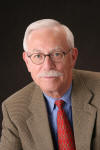A Widow’s Faith: Faith – James Windell
 One of the challenges of widows, my friend and co-author Kristin Meekhof and I hypothesized when we began researching and writing a book for widows, is to deal with a crisis of faith that would result when a husband dies.
One of the challenges of widows, my friend and co-author Kristin Meekhof and I hypothesized when we began researching and writing a book for widows, is to deal with a crisis of faith that would result when a husband dies.
Widows, we initially theorized, would probably reveal to us that the death of a husband would send them into a tailspin – certainly a downward spiral related to their religion, their, faith, their belief in a loving and fair God.
But that’s not at all what we found. After four dozen interviews with widows around the country and from many different sets of circumstances and even from varied socioeconomic classes, we found something completely different. It was their faith and their religion; the beliefs they found in a church or religious environment that sustained them. When we asked them to tell us what they would recommend to other women about how to successfully cope with the death of a husband, so often they suggested that other women should maintain their faith and rely on their religious community for the strength and support to cope with loss.
“Praying, running, and writing helped me the most,” a woman in her thirties told us in describing what got her through the first year after her husband died of cancer.
“What got me through it was that my husband and I both grew up in a rather traditional Jewish house,” Rebecca, whose husband died of leukemia, said. “We always had our faith.”
And Dee, a woman whose husband died very unexpectedly of a sudden heart attack at age 33, advised other widows to “Ask Jesus for help with everything, and try hard to forgive those who wrong you in this grieving process.”
Other women, like Jessica, said, “We were very active in our church, so we had many supportive people I could turn to.” And Mary Anne said: “Faith is what got me through this. I would say that you should get with a church; get with other people going through the same thing.”
Ann, who said she grew up as a Catholic, said, “My church was very helpful. I could fall back on my faith and religion to get through the grieving. We had many friends through the church.”
That seems to epitomize what so many women told us. Yes, it was their faith and their belief in God that provided them a basis for going on with life, but just as importantly there was the friendship and social support. It was in a church or in a synagogue that so many widows found a group of friends who would reach out to them and offer them friendship, emotional comfort, and help when it was needed after the death of a husband.
As Lynn, another widow told us, “The best advice I can give a widow, is to go to a support group at a church. Learn about God. This helps us to realize we all have one commonality — death. No matter who we are, we will all die. God has a plan, and having my faith helped me to realize that.”
Having a faith and a set of religious beliefs helps many people in a time of crisis. But everyone views their church or their religion in a different way. For some, it is a belief in a God who must have a cosmic purpose and it is faith that helps them to trust in that purpose and not question God’s plan. For others, a religious community means just that. They have a community of friends and people with a united sense of purpose and a commitment to offer emotional and psychological support when there are tough times. Putting the two together provides for perhaps a majority of widows the kind of bulwark and strong safety net that is there whenever it is needed.
The widows we have talked to didn’t have a crisis of faith when they lost their husband. Instead it was faith, religious principles, things they had been taught since childhood that carried them through terrible grieving process.
James Windell is an author, columnist, and college instructor. He is the author or co-author of 18 previous books, a newspaper columnist, editor of The Michigan Psychologist, and a group therapist with adolescent delinquents. He teaches criminal justice classes at Wayne State University in Detroit. He writes a wide variety of books, including those related to parenting, medicine, psychology, and criminal justice.

